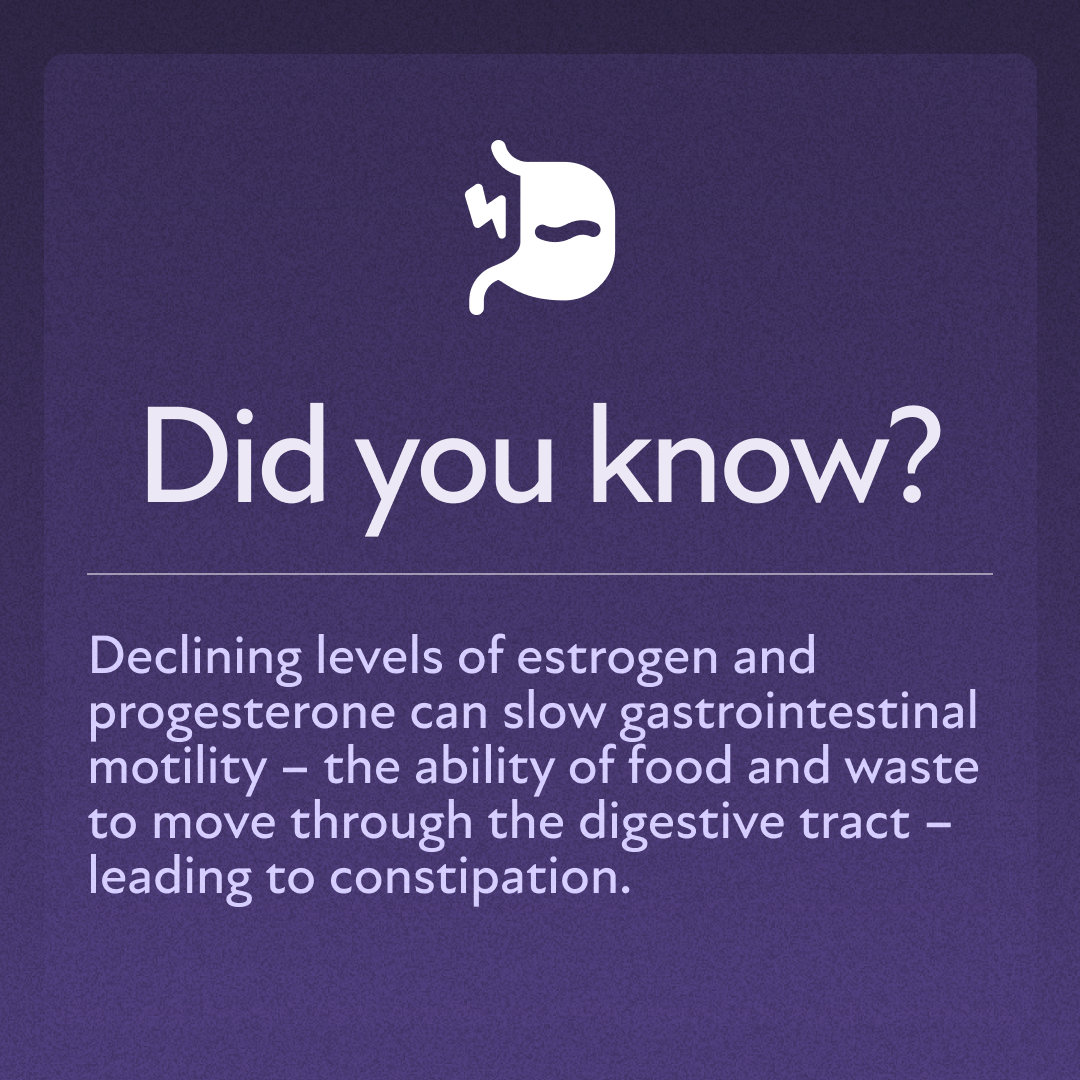Menopause can bring about various physiological changes alongside its standard list of symptoms. Among these, digestive issues, particularly constipation, are a common yet often overlooked side effect.
The Menopause-Constipation Connection
Hormonal fluctuations during menopause can significantly impact digestive health. Declining levels of estrogen and progesterone can slow gastrointestinal motility (the ability of food and waste to move through the digestive tract), leading to constipation.(1)(2)(3)
Common Symptoms
Menopause-related constipation symptoms may include the following:(2)(3)(4)
Difficulty passing stool
Infrequent bowel movements (fewer than three per week)
Straining during bowel movements
Hard, dry, or lumpy stools
A sensation of incomplete bowel evacuation or obstruction
Increased bloating, abdominal discomfort, and excess gas
During menopause, some women also report variations in bowel habits, experiencing alternating episodes of constipation and diarrhea.(5)
Common Causes
Hormonal changes are a key reason for constipation during menopause. Lower estrogen levels can reduce bile production, making digestion less efficient and affecting stool consistency. Estrogen also helps regulate cortisol, the stress hormone, so when estrogen declines, higher cortisol levels may further slow digestion and bowel movements. Contributing factors include the following:(4)(5)(6)(7)
Stress: Elevated cortisol levels can further impede digestion.
Diet: Low fiber intake can exacerbate constipation.
Physical Inactivity: Lack of exercise can slow the digestive process.
Aging: Age-related changes in the digestive system can contribute to constipation.
Menopause and the Gut: The Role of Hormones
Estrogen plays a role in gut health by supporting beneficial bacteria, maintaining the gut lining, and helping the intestines absorb nutrients while keeping harmful substances out of the bloodstream. When estrogen levels decline, this balance can be disrupted, which may contribute to digestive issues and worsen certain menopause symptoms.(2)(3)(6)
Progesterone helps relax muscles, including those in the intestines. When its levels shift in relation to declining estrogen, it can slow the muscle contractions that move food through the digestive tract — known as peristalsis. These hormonal changes may also increase the risk of irritable bowel syndrome (IBS) during menopause, which can lead to changes in bowel habits and increased sensitivity to abdominal discomfort.(1)(3)

Remedies for Constipation During Menopause
Dietary Changes and Fiber
A high-fiber diet is essential for managing constipation, with a recommended fiber intake of at least 25 g daily. Incorporating whole grains, fruits, vegetables, and legumes can help add bulk to the stool and promote regular bowel movements. Foods high in fats should be avoided as they take a long time to be digested.(4)
Hydration and Lifestyle Changes
Adequate hydration softens stool, making it easier to pass. Regular physical activity stimulates intestinal function, aiding digestion. Stress management techniques like yoga or meditation can help regulate digestion and improve gut motility.(4)
Supplements for Constipation Relief
Probiotics: Probiotics may help balance gut bacteria, improving stool consistency and frequency.(2)
Magnesium: This supplement can help relax intestinal muscles and draw water into the intestines, easing constipation.
Digestive Enzymes: These enzymes assist in breaking down food more efficiently, reducing bloating and discomfort.(2)
Natural Remedies for Bloating and Constipation
Herbal teas, such as peppermint and ginger, can help alleviate bloating and stimulate digestion. Natural laxatives like prunes and flaxseeds may also provide relief.(8)
Treatments for Constipation
Hormone Replacement Therapy (HRT)
Modern forms of HRT may alleviate constipation by addressing hormonal imbalances, potentially improving bowel motility. However, effectiveness varies, and GI symptoms should be discussed with a doctor before starting treatment.(2)(9)
Over-the-Counter and Prescription Medications
Laxatives and stool softeners can provide temporary relief but should not be used long term to prevent dependency or adverse effects. For persistent symptoms, medications targeting IBS or other underlying conditions may be prescribed.(4)
When to Seek Medical Advice
Consult a healthcare provider if constipation persists despite lifestyle changes or is accompanied by severe pain, unexplained weight loss, or blood in the stool. These may indicate more serious conditions that require medical attention.(4)
Prevention and Lifestyle Tips
Constipation preventive measures include the following:(4)
Balanced Diet: Maintaining a fiber-rich diet and avoiding processed foods are essential for preventing constipation.
Regular Exercise: Engaging in regular physical activity can help promote digestive health.
Stress Management: Incorporating relaxation techniques into daily routines may reduce cortisol-related digestive issues.
How to Maintain Bowel Regularity
Establishing a regular bathroom routine
Avoiding delaying the urge to have a bowel movement
Limiting intake of caffeine and alcohol, which can dehydrate the body
Avoiding overuse of laxatives to prevent dependency
Constipation is a common concern during menopause due to hormonal changes and other factors. Awareness of the causes and making improvements to diet, lifestyle, and medical care can help manage and prevent constipation, supporting overall well-being during the menopause transition and beyond.
Experiencing menopausal constipation? Discover if HRT is right for you.
If you’ve entered the menopause transition and are struggling with gastrointestinal symptoms, you don’t have to suffer in silence. Take our brief menopause quiz to see if you’re an eligible candidate for HRT. Get started with Winona to take the first step toward feeling better.


